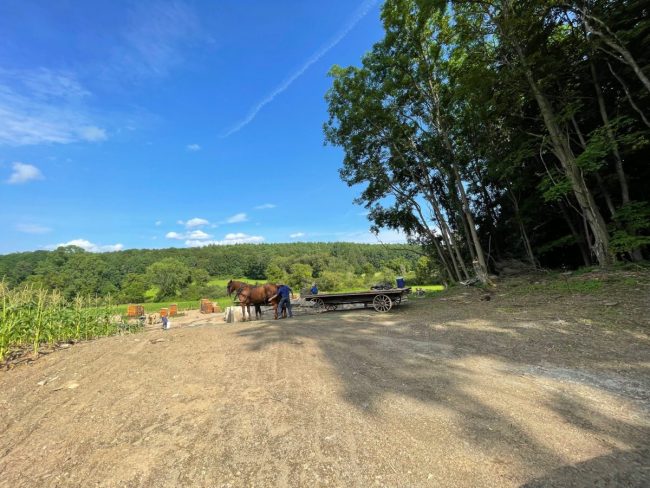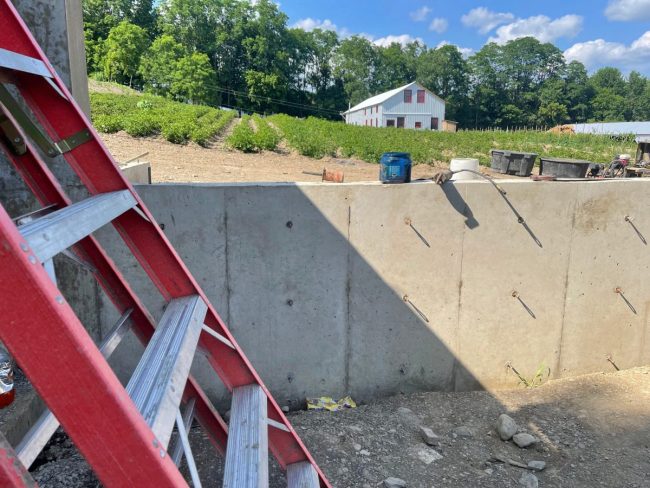The cement work is finished on the new barn; Moise and his sons spent the day cleaning up, using the horses to haul the debris away. They were all covered in mud and cement and soaked with sweat.
Moise does take several breaks a day and goes inside to get out of the sun. He is faithful in this.
He walked me through the foundations and explained what was coming next.
The next task is to hammer finished wood over the cement walls to attach posts and other things and cover the cement as best as I can understand.
This weekend, the clean-up will end, and Sunday is a worship day.
After that, and starting next Friday, they’ll start building the middle part of the walls around the barn.
Then, the roof – the big “raising” on the 28th.
Moise and I had a disagreement over ethics today. It’s not an argument in the sense that I know it, just a different way of seeing things.
I made a mistake in ordering two boxes of pie pans; I got the wrong ones.
I insisted on paying for them and taking responsibility for them.
It was my mistake, not theirs, and I would figure out how to handle it – give them away, find other buyers.
This company makes it difficult and expensive to return things, one reason their prices are so low.
Moise objected to this; he said he would be glad to pay the cost of the pie pan boxes; he was sure they would find a way to use them.
I order many things for the Millers, and this is the second mistake I have made, although it was the biggest.
There were scores of pie pans for sale with dozens of different measurements; I got confused.
It was curious, for sure; I was arguing about spending more of my money, he was arguing about spending more of his.
I have strong ideas about mistakes.
I believe I learn from them; they shape my life.
Many people laugh at me when I make mistakes; there is this idea in our culture that people should be perfect, make no mistakes, and admit none.
Modern media devour politicians if they admit mistakes, yet those who make mistakes and admit them are the ones I want to vote for.
When I make a mistake, which is often as Maria and others can testify, I admit it right away before I am tempted to hide it and see what I can learn.
In this case, I learn a lot about checking the specs on the things I order. I need the orders in writing.
And then recheck them.
Mistakes have shaped my life and been my greatest teacher.
Moise and Barbara have entrusted me to shop for them, which is a big deal for them, and if I take on that responsibility, I should pay for the mistakes I make and then figure out how to deal with them.
That is how I learn things. I think it is an ethical way to see it. I didn’t learn this lesson until middle-aged, but it really stuck with me.
Almost all of the big lessons in my life have come from mistakes. Acknowledging them has been healing and strengthening. I have no secrets anymore.
My whole being feels lighter.
Moise’s ethics were different in this case, and he is perhaps the most ethical human being that I know of; he is worth listening to.
He never lies, cheats, equivocates, exaggerates, or hustles. He is open, straightforward, and honest. He felt my helping him should not cost me money, period.
I dug in a bit, and he dug in perhaps more than a bit.
Moise doesn’t fight; he takes positions and holds them quietly and with few words. His wife says we are like two bulls in an open field sometimes.
Back home, I meditated on this a bit and thought about it. The Amish like compromises, and so do I.
So I came up with one.
I talked to Maria, who is wise and fair, and I drove up to the farmhouse and first ran it by Barbara. She’s a pretty good measure of how Moise will react.
We’d split the cost of my mistake, they would pay half, and I would pay half. Barbara liked it; she said it was fair.
She didn’t like the idea of me absorbing that cost; mistakes would happen, she said, and I spent a lot of time buying things that they needed.
The cost of my time should be considered.
They said they couldn’t be happier with the way I bought their donut and pie and other supplies; they didn’t want me to suffer in any way.
She said 99 percent of the things I had purchased these past few months were exactly right.
I went down to find Moise at the barn raising sight and told him of my idea. “Perfect,” he said, “that’s fair, that’s right.” He made won more shot at paying the whole cost, and I just shook my head and said, “I’m good, this is fine.”
I’ve always been prone to arguing; I like this different approach. We say how we feel honestly and openly, and if there is a difference, we look for the middle ground.
No drama, no grievance, no anger. No winners or losers.
Then it’s over.
Moise dropped it and started showing me how his gravity water irrigation system was working. He held up the house in the heat, and it spouted a heavy stream of water.
I asked him how he learned about building a foundation so cleanly and efficiently; he seemed to have the skills of an engineer, and he said his father taught him, he grew up building things and plowing fields.
“It’s just what we did,” he said. Moise is proud of his work but quite humble. He doesn’t ever acknowledge the extraordinary nature of what he and his family do.
I don’t think he sees himself in that way; the Amish are very big on humility.




Fantastic! Bone-heads unite! I’m one too! Love to all of you everyday. Your posts and the occasional Steven Colbert are antidotes to civilization! Keep on!???
That is going to be one fine barn.
What an extraordinary friendship. So happy for you. I enjoy reading your posts.
You and Moises have a wonderful relationship. Glad things worked out. Mistakes happen. Thank you for sharing your experience. Humility is a virtue.